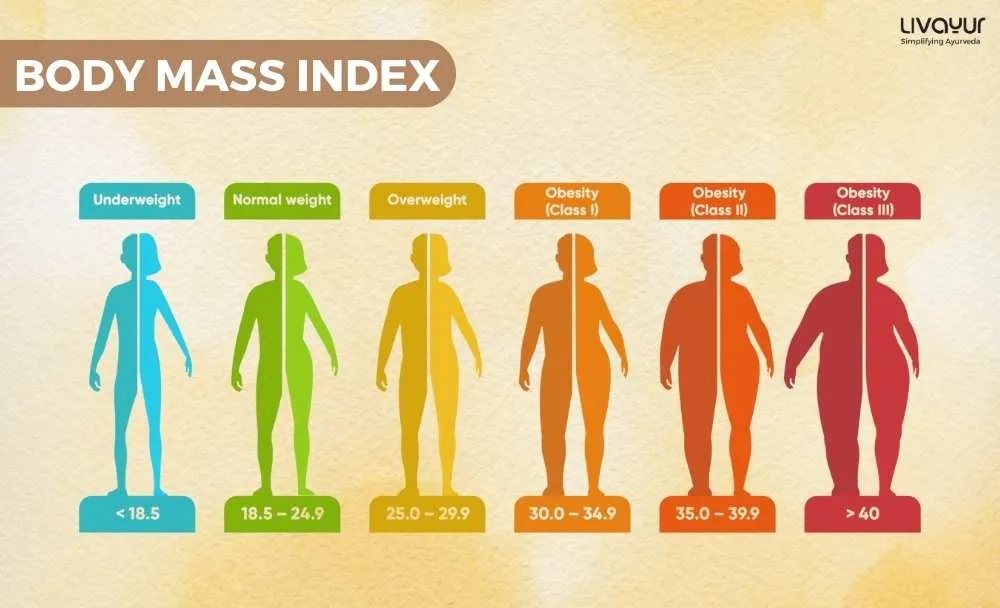This article is reviewed by DR. Deepa Gandhi

Your body weight plays an important role in your health.
An excess amount of body weight can lead to serious health conditions such as heart disease, stroke, and type 2 diabetes. Conversely, underweight can indicate malnutrition (1).
Having an appropriate amount of body weight is therefore essential. It not only helps with the absorption of vitamins and minerals but also aids in regulating body temperature and protecting vital organs (1).
One of the best screening tools used to measure a person’s body weight is BMI or body mass index.
Let’s understand more about BMI and how it is calculated in this article.
What is BMI?
The body mass index (BMI) is a measure of a person’s weight status that is calculated by dividing their weight in kilograms by their height in metres squared (2).
It is a cost-effective and simple way to determine if an individual falls into the categories of underweight, healthy weight, overweight, or obese (2). A higher BMI is typically associated with a higher percentage of body fat .
However, it is important to note that BMI is not always an accurate indicator of overall health. Healthcare professionals commonly use a variety of tools and tests, in addition to BMI, to assess an individual’s health status and potential risks (1).
How To Calculate BMI? (2)
To calculate BMI, the same formula is used for both adults and children.
For metric units, the formula is the weight (kg) divided by height (m) squared. If the height is measured in centimetres, it is divided by 100 to get the height in metres.
For imperial units, the formula is the weight (lb) divided by height (in) squared multiplied by 703.
How To Interpret BMI? (2)
For adults, BMI is interpreted using standard weight status categories, regardless of sex or body type.
These categories are underweight (below 18.5), healthy weight (18.5 – 24.9), overweight (25.0 – 29.9), and obese (30.0 and above).
For children and teenagers, BMI is interpreted differently and is age and sex-specific since the amount of body fat changes with age and differs between girls and boys (2).
The Final Takeaway
Maintaining a healthy body weight is crucial for overall health and well-being. Excess body fat can lead to serious health conditions, while insufficient body fat can indicate malnutrition.
The body mass index (BMI) is a useful screening tool that can help individuals determine if they fall into the categories of underweight, healthy weight, overweight, or obese. However, it is important to note that BMI is not always an accurate indicator of overall health, and healthcare professionals use a variety of tools and tests to assess an individual’s health status and potential risks.
Still, understanding how BMI is calculated and interpreted can help individuals make informed decisions about their health and take steps to maintain a healthy weight.
References
- https://my.clevelandclinic.org/health/articles/9464-body-mass-index-bmi
- https://www.cdc.gov/healthyweight/assessing/bmi/adult_bmi/index.html
Kindly note:
BMI is not an accurate measure when it comes to analysing body fat
- BMI measures overall health status in relation to height and weight. No mention of body fat percentage or muscle mass.
- It does not distinguish water weight, bone mass, etc.
- It is not specific to the sex of a person. For e.g.: the BMI of males and females is the same whereas the male has more muscle mass and the female has more fat mass which is not mentioned in the BMI chart
This website’s & BMI Calculator’s complete content is only meant to be used for information dissemination. The information is not meant to be used in any way or form for the diagnosis, cure, or prevention of any disease or lifestyle disorder. While the BMI calculator is a good indicator of health & associated risk but it is not a holistic measure of health. Please be aware that none of the services provided by the website are meant to replace the advice from your personally trained medical practitioner or any other medical professional. The application of any comments or advice with regard to your symptoms or medical condition is not in any way the responsibility of the organization.





















Great goods from you, man. I’ve understand your stuff previous to and you are just extremely fantastic. I actually like what you have acquired here, certainly like what you are saying and the way in which you say it. You make it enjoyable and you still care for to keep it wise. I cant wait to read much more from you. This is really a tremendous site.
After all, what a great site and informative posts, I will upload inbound link – bookmark this web site? Regards, Reader.
Howdy! Do you know if they make any plugins to help with Search Engine Optimization? I’m trying to get my blog to rank for some targeted keywords but I’m not seeing very good success. If you know of any please share. Cheers!
A person essentially help to make seriously articles I would state. This is the first time I frequented your website page and thus far? I surprised with the research you made to make this particular publish extraordinary. Fantastic job!
Thanx for the effort, keep up the good work Great work, I am going to start a small Blog Engine course work using your site I hope you enjoy blogging with the popular BlogEngine.net.Thethoughts you express are really awesome. Hope you will right some more posts.
Excellent blog! Do you have any recommendations for aspiring writers? I’m planning to start my own website soon but I’m a little lost on everything. Would you propose starting with a free platform like WordPress or go for a paid option? There are so many options out there that I’m totally confused .. Any recommendations? Cheers!
We’re a group of volunteers and opening a new scheme in our community. Your site provided us with valuable information to work on. You’ve done an impressive job and our entire community will be grateful to you.
Pretty! This was a really wonderful post. Thank you for your provided information.